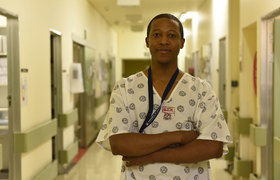Academic calls for emotional leadership in healthcare
23 June 2025 | Story Staff writer. Photo Supplied. Read time 5 min.
A commentary piece published in the South African Journal of Science has sparked urgent national conversation around the emotional toll of South Africa’s public healthcare crisis and the leadership response it demands.
Written by Professor Jacqueline Hoare, the head of the Division of Consultation Liaison Psychiatry at Groote Schuur Hospital and the University of Cape Town (UCT), the piece introduces the concept of “emotional leadership” as an essential tool for addressing escalating stress, burnout and moral distress among healthcare professionals.
Amid cuts to South Africa’s national health budget, an escalating burden of disease and the withdrawal of funding to South African healthcare projects by the United States (US) Agency for International Development (USAID), the US President’s Emergency Plan for AIDS Relief (PEPFAR) and health science research cuts by the National Institute of Health (NIH), Professor Hoare argues that the emotional well-being of healthcare workers and health science researchers can no longer be an afterthought.
“We are expecting those working in health science to keep caring while working in systems that are increasingly uncaring. Emotional leadership is not a luxury, it is a necessity,” she stated.
The piece argues that the 2024/2025 budget cuts, compounded by the scaling back of US-funded programmes like USAID, PEPFAR and NIH are creating dire conditions across the public health system and health science research. These changes are not abstract – they mean fewer staff, fewer posts for young doctors and researchers, fewer services and health science research to support the country’s most vulnerable populations.
State of mental well-being
According to a 2023 survey by the Medical Protection Society, 35% of healthcare workers reported that their mental well-being is worse now than during the COVID-19 pandemic. More than 59% cited staff shortages as a primary factor, while nearly 40% expressed concerns that burnout is undermining patient safety.
Hoare argues that the outlook is bleak for junior doctors, health science students and health researchers, as all work under intense emotional and physical strain in under-resourced facilities, often with no job prospects due to diminishing training and employment opportunities.
“We need leaders who not only manage systems but care for the people holding them together.”
In this harsh climate, Hoare argues that leadership styles must evolve. Emotional leadership, she explained, is defined by the ability to be empathically attuned to colleagues’ needs, to listen actively, to communicate clearly and compassionately, and to manage relationships with humility and respect.
“Emotional leadership won’t solve every crisis in healthcare and health science research, but how we lead will shape how teams survive it,” said Hoare. “We need leaders who not only manage systems but care for the people holding them together.”
Emotional leadership is based on four key competencies:
- Self-awareness: Recognising how a leader’s emotions impact others.
- Empathy: Understanding and validating the emotions of colleagues.
- Social skills: Navigating difficult conversations and complex team dynamics.
- Relationship management: Fostering a psychologically safe environment built on trust, respect and dignity.
Hoare’s article points to multiple studies indicating that emotionally intelligent leadership is associated with improved morale, lower bullying rates, enhanced team performance and better patient outcomes. Emotional leadership also enhances the learning environment for students, many of whom report anxiety about their future in medicine.
Moral distress
A major focus of the commentary is moral distress: the pain healthcare workers and health science researchers experience when they know what patients need and what scientific research is critical to improve health in our country but cannot deliver it due to systemic constraints. Delayed surgeries, suspended programmes, crumbling infrastructure, and research funding cuts leave those in health science feeling helpless, sad, angry and disillusioned.
“This is not the way medicine is meant to be practiced with clinicians detached, depleted and isolated. We’re not just losing energy, but our sense of purpose,” she said.
“Making medicine about people, both patients and providers, begins with how we lead.”
Moral distress is especially dangerous because it chips away at the ethical and emotional foundations of care. When healthcare workers are unable to act on what they know to be right, they feel complicit and often experience burnout or leave the profession altogether.
Hoare emphasises that emotional leadership does not replace the need for systemic reform but can begin changing the culture from within. Valuing emotional labour, she said, means explicitly recognising caring, empathy and emotional support as leadership skills – and building them into job descriptions, performance evaluations and institutional training.
Integration into curricula
She proposes integrating emotional leadership into medical curricula and postgraduate education, especially for those stepping into supervisory roles. Creating emotionally safe environments – where speaking up, showing vulnerability and seeking help are not punished – is essential to retaining staff and restoring joy in medicine.
“Caring for the carers must be a core institutional value. We can’t keep relying on the emotional labour of a few heroic individuals while the system erodes beneath them,” she noted.
Research consistently shows that emotionally supported healthcare teams provide better patient care. When doctors and nurses feel safe, valued and heard, they communicate more effectively, make fewer errors and build stronger relationships with patients.
Hoare concludes with a challenge to the health sector: to embrace emotional leadership not just as a coping mechanism, but as a strategic and ethical imperative.
“Making medicine about people, both patients and providers, begins with how we lead. It starts one conversation, one colleague, and one moment of empathy at a time,” she writes.
 This work is licensed under a Creative Commons Attribution-NoDerivatives 4.0 International License.
This work is licensed under a Creative Commons Attribution-NoDerivatives 4.0 International License.
Please view the republishing articles page for more information.










